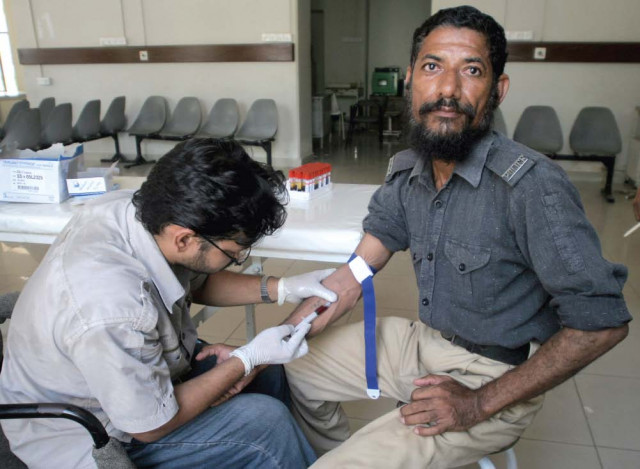Experts sound alarm bells on rising incidence of hepatitis cases
Govt, private sector should make joint efforts to curb the spread of the disease, says DUHS VC

PHOTO: EXPRESS/FILE
"As a nation, we are at a crossroads," he said. "We will lose the chance to eradicate hepatitis, which leads to cancer, if we fail to make efforts in the right direction." He said that government and the private sector need to make joint efforts to ensure the eradication of hepatitis by 2030.
Qureshi said this while addressing a seminar held on Saturday at DUHS Ojha campus, in observance of the World Hepatitis Day. The seminar was organised by the National Institute of Liver and Gastro Intestinal Diseases (NILGID).
Speaking on the occasion, Qureshi said that programmes to raise awareness about hepatitis are being conducted across the world, as this disease has made a global impact. The World Health Organisation has set a deadline of 2030 for the eradication of hepatitis, he said, adding that all relevant institutions as well as the government should take measures to curb its spread and inform the masses about the disease, its treatment and cure, to achieve this goal.
Doctors want govt to devise strategy to eliminate hepatitis by 2030
He informed the audience that all facilities for the treatment of hepatitis are available at the Dow University Hospital, including those required for liver transplant, which is usually carried out to treat end-stage hepatitis.
DUHS Registrar Amanullah Abbasi said that five per cent of Pakistan's population has hepatitis C, which is the highest in the world after Egypt. He said that 6.7% of the population in Punjab, 5% in Sindh, 1.5% in Balochistan and 1.1% in Khyber Pakhtunkhwa is suffering from hepatitis.
Abbasi pointed out that one of the major causes contributing to the spread of hepatitis is the reuse of syringes. He said that if steps are taken to stop this practice, around 1.57 million people can be safeguarded against hepatitis C and another 300,000 can be protected against hepatitis B. As much as 60% of hepatitis patients develop the disease as a consequence of reuse of syringes, he added. Referring to hepatitis C, he termed the condition a "silent killer" and stressed that everyone should be properly screened for the disease as it symptoms are very similar to other diseases.
Speaking at the seminar, NIGLID Director Dr Nadeem Hassan said that fatty-liver is a "self-inflicted disease." He quoted an American scholar and said that fatty-liver is mainly a consequence of fast food consumption. Fast food chains have caused wide-scale destruction in this regard, remarked Dr Hassan. He said that a large segment of the population has developed fatty liver but only those suffering from the condition can cure it. He stressed the need for developing healthy eating habits and eating smaller portions of food to overcome the problem. Reducing only 10% body weight can resolve half of the problem, said Dr Hassan.
One in 10 people is a hepatitis C carrier
According to Dr Tayyab Usmani, hepatitis is the third major cause of deaths resulting due to cancer. Out of every 100,000 people in Pakistan, six are victims of hepatitis, he said. Dr Usmani also drew attention towards the shortage of hepatitis A vaccine in Pakistan and said that government needs to take notice of the alarming situation.
At the end of the seminar, Qureshi and Dr Hassan presented shields to the speakers and the organisers of the event.
In observance of the World Hepatitis Day, Qureshi also led a walk, from the main gate of DUHS to the OPD block, before the commencement of the seminar. The varsity's Pro Vice-Chancellor Zarnaz Wahid also participated in the walk.
Published in The Express Tribune, July 29th, 2019.



















COMMENTS
Comments are moderated and generally will be posted if they are on-topic and not abusive.
For more information, please see our Comments FAQ